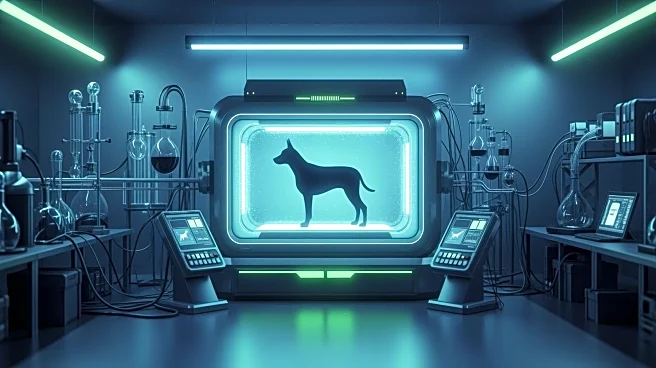What's Happening?
Tom Brady, the retired NFL star and current Fox Sports broadcaster, has revealed that his family dog, Junie, is a clone of their previous pet, Lua, a pitbull mix who passed away in 2023. Brady utilized the services of Colossal Biosciences, a company specializing
in de-extinction and animal cloning, which recently acquired Viagen, a firm known for its cloning technology. Brady expressed his gratitude for the opportunity to have a 'second chance' with Junie, thanks to Colossal's non-invasive cloning process. This process involves a simple blood draw from the original animal, followed by somatic cell nuclear transfer to create an embryo that is then implanted into a surrogate. Brady's decision to clone his dog is part of a broader trend among celebrities, including Paris Hilton and Barbra Streisand, who have also cloned their pets.
Why It's Important?
The cloning of pets, as demonstrated by Tom Brady's experience, underscores the growing interest and capabilities in genetic technology. This development has significant implications for the biotechnology industry, particularly in the realm of animal cloning and de-extinction efforts. Colossal Biosciences aims to leverage these technologies not only for pet cloning but also for conservation purposes, such as reviving extinct species like the woolly mammoth and Tasmanian tiger. The ethical considerations surrounding animal cloning remain contentious, with public opinion divided on its moral acceptability. However, the technology offers potential benefits for preserving endangered species and providing comfort to pet owners who have lost beloved animals.
What's Next?
As Colossal Biosciences continues to advance its cloning technologies, the company may face increased scrutiny and debate over the ethical implications of cloning. The biotechnology sector could see further developments in cloning techniques, potentially leading to more widespread adoption for both conservation and personal purposes. Stakeholders, including animal rights groups and ethical committees, may engage in discussions to address the moral concerns associated with cloning. Additionally, the financial aspect of cloning, with costs comparable to purchasing a new car, may limit accessibility to a broader audience, potentially influencing market dynamics in the pet industry.
Beyond the Headlines
The cloning of pets raises deeper ethical questions about the nature of life and the extent to which humans should intervene in natural processes. While cloning offers a genetic replica of the original animal, environmental factors still play a role in shaping behavior, suggesting that cloned pets may not entirely replicate the personalities of their predecessors. This technology also prompts discussions about biodiversity and the potential consequences of reviving extinct species, which could impact ecosystems and conservation strategies. As cloning becomes more prevalent, society may need to navigate the balance between technological advancement and ethical responsibility.



















